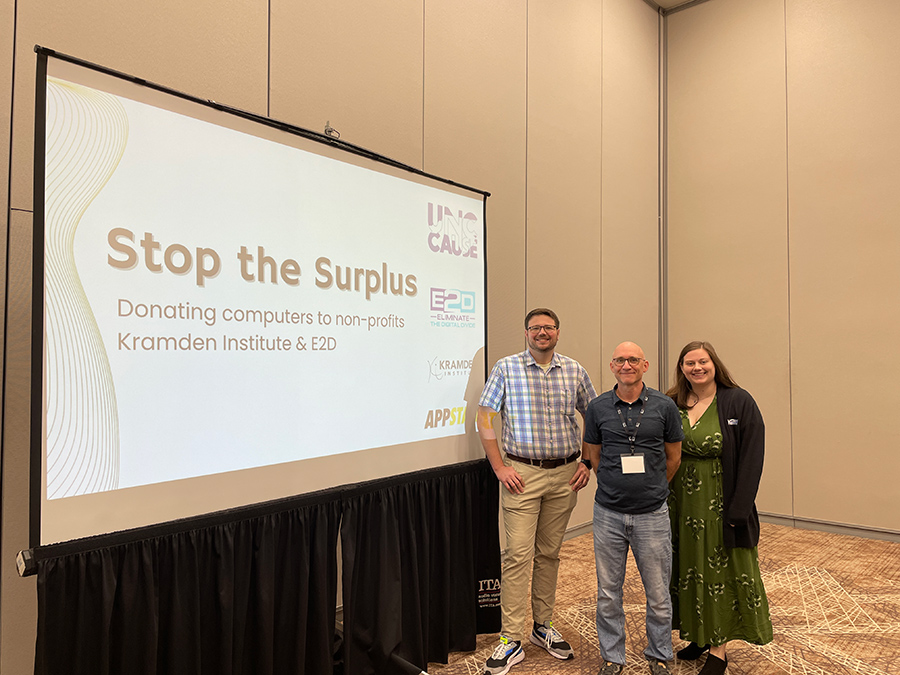BOONE, N.C. — Over the past two years, Appalachian State University Information Technology Services (ITS) has donated more than 2,400 computers and 450 monitors for refurbishment and distribution to low-income families in North Carolina in an effort to mitigate electronic waste. According to ITS, the university is one of the largest contributors to e-waste reduction in the University of North Carolina System.
A 2021 change in North Carolina legislation allows state institutions to partner with Kramden Institute and E2D, Eliminate the Digital Divide — North Carolina’s two nonprofit computer refurbishers — to repurpose surplus technology and limit e-waste, which, according to the U.S. Environmental Protection Agency, is the fastest-growing waste stream in the world.
“To strengthen our resilience as an institution, ITS prioritizes sustainability initiatives in the work we do, as well as civic engagement to promote educational and technological access for all,” said App State’s Tom Van Gilder, interim associate vice chancellor and chief information officer. “This new solution for managing surplus, limiting e-waste and supporting the High Country community is just one way we can meet those objectives with a sustainable solution.”
E-waste has become an emerging problem worldwide, according to the 2020 Global E-Waste Monitor, which reported that the world generated 53.6 million metric tons (or 62 U.S. tons) of e-waste in 2019, with less than 20% of this waste being recycled. The report estimated that global e-waste will reach 74 metric tons, or approximately 81.5 U.S. tons, by 2030.
Previously, at App State, all end-of-life computers, monitors, printers and other electronics were either resold as surplus or dismantled and sold as e-waste.
“We have desired a solution like this for a long time. Now we see these devices going to a good cause, and some are even coming back to our community,” said Tom McDonnell, director of App State’s IT Support Services.
These e-waste reduction efforts align with and support the university’s strategic plan priority of strengthening resilience and sustainability.

Pictured, from left to right: Tom Walters, director of technical operations at Kramden Institute, Tom McDonnell, director of IT support services at App State, and Ashley Smith, director of technology at E2D, present about their computer equipment donation program at UNC CAUSE, the annual statewide technical conference for UNC System IT staff. Photo by Ellen Gwin Burnette
The digital divide
According to E2D, the digital divide is the opportunity gap that exists between those who have access to computers and the internet and those who do not. An estimated 328,000 households or 1 in 5 North Carolinians lack a modern laptop or desktop at home.
The original cost to manufacture a computer is more efficient the longer a computer is in the ecosystem and being used. When E2D or Kramden refurbishes a device, they can give it life for a new user for another four to six years, for roughly $150.
Both Kramden and E2D address device needs in low-income communities, provide refurbishment and computer training for students and deliver better access to the internet to create thriving citizens in the classroom and the state’s economy. This year, Kramden plans to distribute 43 refurbished iMacs in the High Country community.
What do you think?
Share your feedback on this story.
About Information Technology Support Services
Appalachian State University’s Information Technology Support Services, part of Information Technology Services, provides computing service, support and consultation to App State’s faculty, staff and students. Additionally, IT Support Services designs, implements and troubleshoots technology solutions for App State, providing a standard set of hardware and software application recommendations. Learn more at https://support.appstate.edu.
About Information Technology Services
Appalachian State University’s Information Technology Services (ITS) is committed to providing innovative and reliable technological resources and support for teaching, research, learning and working. ITS is responsible for implementing, monitoring and maintaining all centralized information technology — such as network services, technical infrastructure, data center operations, VoIP phone lines, desktop support, academic technology, print and copier services, research computing, information security and project management. ITS is led by the chief information officer and comprises seven central IT divisions: Academic and Emerging Technologies, Enterprise Applications, Information Security, Infrastructure, IT Support Services, Systems and Research Computing and the Project Management Office. Learn more at https://its.appstate.edu.
About Sustainability and Energy Management at App State
Appalachian State University’s leadership in sustainability is known nationally. The university’s holistic, three-branched approach considers sustainability economically, environmentally and equitably in relationship to the planet’s co-inhabitants. The university is an active steward of the state’s interconnected financial, cultural and natural resources and challenges students and others think critically and creatively about sustainability and what it means from the smallest individual action to the most broad-based applications. The university offers both undergraduate and graduate academic degree programs that focus on sustainability. In addition, 100 percent of Appalachian’s academic departments offer at least one sustainability course or course that includes sustainability, and all students graduate from programs that have adopted at least one sustainability learning outcome. Learn more at https://appstate.edu/sustainability.
About Appalachian State University
As a premier public institution, Appalachian State University prepares students to lead purposeful lives. App State is one of 17 campuses in the University of North Carolina System, with a national reputation for innovative teaching and opening access to a high-quality, cost-effective education. The university enrolls more than 21,000 students, has a low student-to-faculty ratio and offers more than 150 undergraduate and 80 graduate majors at its Boone and Hickory campuses and through App State Online. Learn more at https://www.appstate.edu.













